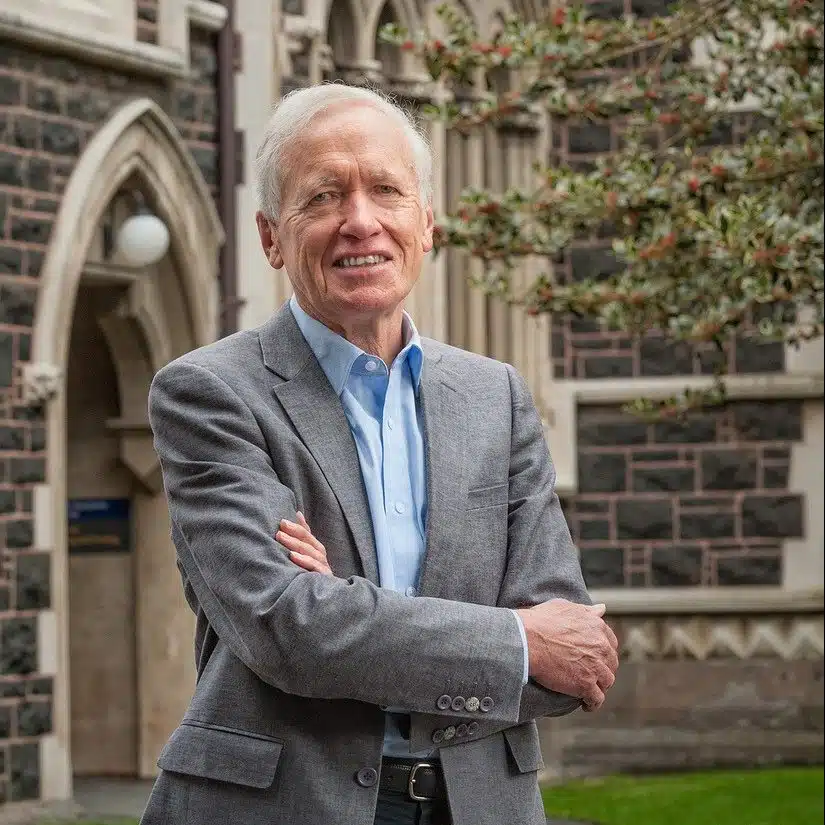Professor Sir David Skegg KNZM OBE
Every year in this country, a national cervical screening programme saves the lives of at least 100 women.
That programme exists partly because of the work of Professor Sir David Skegg, a man who has dedicated his life to fighting cancer and other debilitating diseases.
Sir David is a world-renowned leader, academic, health advisor and epidemiologist. People working in this last field are sometimes described as ‘disease detectives’ – they research what kinds of people get a disease, why they get it, and how those diseases can be controlled.
Sir David was born in Auckland in 1947 and educated at King’s College, where his father was the head of physical education. He went on to study at Auckland University and the University of Otago Medical School.
“Student life at Otago was a life-changing experience for me,” says Sir David.
“I fell in love with Dunedin. I also fell in love with my future wife, Dr Keren Skegg – she also graduated in medicine and became a psychiatrist.”
Sir David graduated at the top of his class in 1972. During his studies, he had developed a passion for preventive medicine – so he moved to Oxford University to work alongside the world’s leading epidemiologist, Sir Richard Doll.
“Sir Richard had discovered the link between cigarette smoking and lung cancer, as well as much else about the causes of cancer,” says Sir David.
“He agreed to be my PhD supervisor, and later I became a lecturer in epidemiology in his department.
“We spent seven happy years in Oxford, and Keren did her postgraduate training in psychiatry there.”
At age 32, Sir David returned to Dunedin as Chair of Preventive and Social Medicine at the University of Otago.
“The department I headed was at a low ebb when I arrived in 1980, but it gradually grew to become the largest in the university, with about 130 staff.”
“I enjoyed teaching medical students and was active in research. Fortunately, I had some wonderful colleagues, and nearly all my research involved working with others.”
In 2004, Sir David’s life took an unexpected turn when he was appointed vice-chancellor of the university – an organisation with 20,000 students and over 4,000 staff.
“I think the greatest privilege of my career was leading the University of Otago for seven years,” he says.
“People often say that being a vice-chancellor is a lonely role. I never found that. There was a great sense of camaradierie and I always felt that the great majority of people were behind me.”
Sir David’s research mostly focused on the causes and control of cancer – especially cervical cancer and breast cancer. Over the years he has also researched melanoma, childhood cancer, and prostate cancer.
“One of the things I like about epidemiology is that you can apply the methods to all sorts of health problems, so I have also been involved in research on multiple sclerosis and on the safety of several forms of contraception.”
Sir David’s leadership skills have seen him head many important groups, focusing on public health issues or on the safety of medicines and blood products. He has, for instance, chaired the Health Research Council and the Public Health Commission.
In the mid-1980s, he chaired national committees on breast cancer and cervical screening.
He was called as an independent witness for the Gisborne Cervical Cancer Inquiry and for the famous Cartwright Inquiry into the treatment of cervical cancer patients at National Women’s Hospital. One of his own phrases – ‘the unfortunate experiment’ – became widely associated with the latter.
Sir David says it is his work on cervical cancer that has given him the greatest satisfaction of his career.
“After I came back to New Zealand, my colleagues and I realised we were facing an approaching epidemic of cervical cancer in young women,” he says.
“It took about 10 years – including all the traumas of the Cartwright Inquiry – before we got a good cervical screening programme, but it is now saving many lives.”
Sir David has garnered many prestigious awards for his health research and leadership, including the Royal Society of New Zealand’s Sir Charles Hercus Medal, the University of Otago’s Distinguished Research Medal, an OBE for services to medicine and, in 2009, a knighthood.
His leadership skills are also recognised in the international arena.
For instance, he was heavily involved with a long-running World Health Organization programme to improve sexual and reproductive health in developing countries.
“Geneva seemed like my second home – I travelled there nearly 50 times,” Sir David says.
“I found it a real privilege to become friends with people from very different cultures, and some of the world’s best scientists in my field were involved.”
Leaders tend to meet other leaders and, over the years, Sir David has worked with many great ones. He’s also worked with some poor ones, and many who are somewhere in-between.
“I think that everyone has got the capacity to be a leader in some sphere of their life, just like we all need to be followers in certain situations,” says Sir David.
What qualities do the great ones have?
“Leaders need integrity – people need to be able to trust what they say – energy, and the ability to energise other people and to inspire morale.
“Leaders also need vision, and they also have to be willing to accept criticism. I think that’s very important. And a sense of humour helps as well.”
Three times in Sir David’s career, he has had to drop much of his work to focus on an urgent infectious disease problem.
The first time was during the 1980s for the HIV/AIDS pandemic and the second was in 1996, when it was discovered that ‘mad cow disease’ was linked to a horrible brain disease in young adults.
The third time was in 2020, when Sir David was asked to be a special advisor to Parliament’s Epidemic Response Committee dealing with Covid-19.
He has since become even more heavily involved with the pandemic, chairing the Strategic Covid-19 Public Health Advisory Group that advised the Government on issues such as re-opening borders as New Zealanders got vaccinated.
Sir David says Covid-19 is not going away and will continue to evolve. The biggest challenge for many people will be living with an uncertain future.
“Despite our poor preparation, all New Zealanders can be proud that the response of this country has so far been second to none,” he says.
“We’ll learn more about the vaccines, and hopefully we may get even better anti-viral treatments.
“We’ll need to keep adapting, and to strengthen our health system, and our public health response.”
Looking beyond the pandemic, Sir David says we will need to work hard as a society to ensure that children growing up in New Zealand get the same opportunities most of us have enjoyed.
To achieve this, we must confront the challenges of environmental deterioration, child poverty, and an ailing health system.
What does Sir David see in his own future?
“If you ask my wife, she’d tell you I’ve got a lot of unfinished business – but it’s mostly around my house,” he says.
“I’ve had a fascinating career, and much of it was unplanned, so I won’t be too surprised if some new challenges crop up.”


